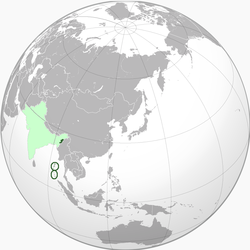Provisional Government of Free India
| Provisional Government of Free India | ||||||||||
|
आर्ज़ी हुक़ूमत-ए-आज़ाद हिन्द Ārzī Hukūmat-e-Āzād Hind |
||||||||||
| Unrecognized state, puppet regime of the Empire of Japan | ||||||||||
|
||||||||||
|
||||||||||
|
Anthem Subh Sukh Chain |
||||||||||
|
Light green: Territory claimed.
Dark green: Territory controlled (with Japanese assistance). |
||||||||||
| Capital | Port Blair (provisional) | |||||||||
| Capital-in-exile |
Rangoon Singapore |
|||||||||
| Languages | Hindustani | |||||||||
| Government | Provisional government | |||||||||
| Head of State | ||||||||||
| • | 1943–1945 | Subhas Chandra Bose | ||||||||
| Prime Minister | ||||||||||
| • | 1943–1945 | Subhas Chandra Bose | ||||||||
| Historical era | World War II | |||||||||
| • | Established | 21 October 1943 | ||||||||
| • | Disestablished | 18 August 1945 | ||||||||
| Currency | Rupee | |||||||||
|
||||||||||
Ārzī Hukūmat-e-Āzād Hind (Hindi: आर्ज़ी हुक़ूमत-ए-आज़ाद हिन्द), the Provisional Government of Free India, or, more simply, Free India (Azad Hind), was an Indian provisional government established in occupied Singapore in 1943 and supported by Japan and by Nazi Germany.
It was a part of a political movement originating in the 1940s outside of India with the purpose of allying with Axis powers to free India from British Rule. It was established by Indian nationalists-in-exile during the latter part of the Second World War in Singapore with monetary, military and political assistance from Imperial Japan. Founded on 21 October 1943, the government was inspired by the concepts of Subhas Chandra Bose who was also the leader of the government and the Head of State of this Provisional Indian Government-in-exile. The government proclaimed authority over Indian civilian and military personnel in Southeast Asian British colonial territory and prospective authority over Indian territory to fall to the Japanese forces and the Indian National Army during the Japanese thrust towards India during the Second World War. The government of Azad Hind had its own currency, court and civil code, and in the eyes of some Indians its existence gave a greater legitimacy to the independence struggle against the British.
However, while it possessed all the nominal requisites of a legitimate government, it lacked large and definite areas of sovereign territory until Japan gave it nominal authority of the Andaman and Nicobar Islands in 1943 and the occupation of parts of Manipur and Nagaland. Japanese officials made all the decisions, and throughout its existence it was entirely dependent on Japanese support.
...
Wikipedia



